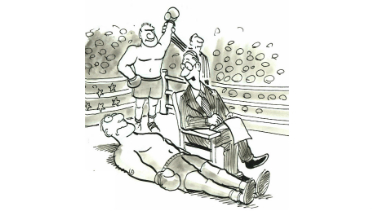Chris Lytle has conducted nearly 2300 seminars throughout the English-speaking world. A gifted speaker and the best-selling author of The Accidental Salesperson, Chris has inspired hundreds of thousands of salespeople. He posts a fresh new audio sales idea on this website every week. You can grab a free sample here. Email it to your sales team. They can get world-class sales training on their smart phones.
Chris Lytle
13
Jun2016
Tattoo is our 14-year old Abyssinian.
Right before New Year’s Eve, I found her in our bedroom closet limping. A quick trip to the veterinarian confirmed she had dislocated her back right knee.
Who knew that could happen?
She had surgery on January 5th and will have to wear a cone until Friday when she gets her stitches removed. (Yes, they call it an E-Collar, but it’s a cone.)
Here’s a cone for you.
The Cone of Experience (later called The Cone of Learning) was developed by Edgar Dale, an educator. It was later adapted and promoted by National Training Labs, founded by Kurt Lewin. “There is nothing more practical than a good theory,” is my favorite Kurt Lewin-ism.
This model purports to show you how to make learning (training) stick. Make your training more participative.
Make sure you’re doing more active learning than passive learning.
Disclaimer: Above, I used the word “purports” because you can find plenty of criticism online about this model. The main one is that it would be statistically impossible to have each kind of learning method 10% better than the other. Nobody ever really scientifically proved this to be true.
That said, I still believe the right side of the model shows you the clear line of demarcation between active and passive learning. Have more discussions. Get your salespeople presenting and practicing.
Adults learn by doing, not by hearing how the trainer did it.
One of my early influences as a trainer was Bob Pike. He did seminars for people who do seminars. Pike says, “Adults learn better and retain more when they are involved in the process.”
Active learning involves your salespeople. They will be happy to participate in their own development if you encourage it.
You will be happy when you see how much faster they improve when you use more active learning.
Tattoo will be ... Read More
June 13, 2016Chris Lytle
06
May2016
You were minding your own business and selling up a storm. And then . . .
BAM!
. . . you got promoted. You’re the new sales manager.
The “Paradox of Management” is this: You get paid for doing less of what you got promoted for doing more of.
As a salesperson, all you had to do was sell. Sure, there were tough customers and fires to put out. Once you accept the position of sales manager, however, you add a new level of complexity to your work life.
How much complexity? You ask.
Well, herding cats is easy compared to managing a sales team.
The American Marketing Association’s online dictionary offers this definition of sales management:
The planning, direction, and control of the personal selling activities of a business unit, including recruiting, selecting, training, equipping, assigning, routing, supervising, paying, and motivating as these tasks apply to the sales force. Sales management involves three interrelated processes: (1) formulation of a strategic sales program; (2) implementation of the sales program; and (3) evaluation and control of sales force performance. In formulating the strategic sales program, sales management involves a number of activities including development of account management policies, demand forecasts, and quotas and budgets; sales organization; sales planning; territory design; deployment; and routing. In implementing the sales program, sales management activities include supervising, selecting, recruiting, training, and motivating the sales force. In addition, implementation requires the development of compensation systems and sales force incentive programs. The evaluation and control of sales force performance involves the development and enforcement of methods for monitoring and evaluating sales force performance. Sales management activities typically required for evaluation and control include behavioral analysis, cost analysis, and sales analysis.
You’ve probably thought of this already: You’ll want to copy and paste the above definition to a Word DOC and print it out. Then, ... Read More
May 6, 2016Chris Lytle
29
Apr2016
If you want to save yourself from another bad hire, then ask this question toward the end of your first interview:
We’re about finished with this interview. After this, I will start my reference checking and due diligence. Is there anything you would like to tell me now rather than have me find it out later from an outside source or reference?
Watch what happens once you pose this question.
See if the candidate’s eyes dart about in his or her head. Follow the thought processes as candidates reach back into the past to see if there’s any secrets they’re willing to share.
Allow at least three minutes of “dead air” to give the candidate some thinking time. And get ready to receive some fascinating new information.
Candidates will reveal some negative information about themselves.
Why?
Because they would rather put their spin on the information rather than have you hear it from a reference.
Add this question to your list of interview questions: “Is there anything you would like to tell me now rather than have me find out from an outside source or reference?”
You do have a list of questions you ask to every candidate in the same order every time, don’t you?
Call me if your need help getting started with your list. My number is at the top of this website.
April 29, 2016Chris Lytle












